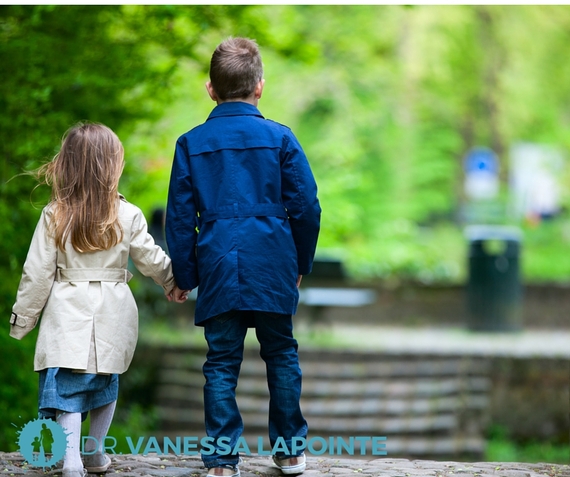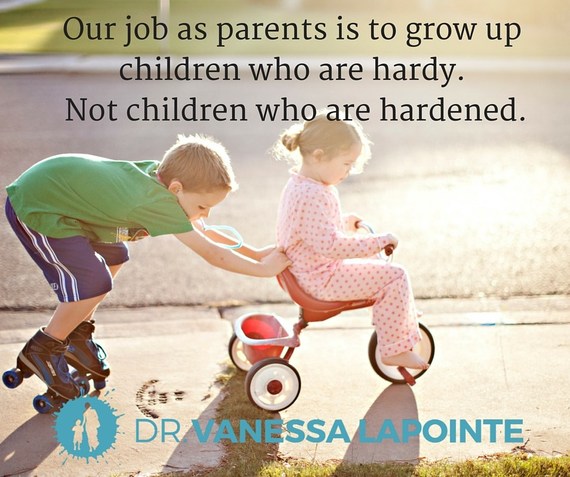People often get worried that discipline without damage, or "compassionate" parenting, means that you have to tippy-toe around your child, and further, that your child will never learn the limits and rules that are a reality of life. But this just simply is not the message -- at all. Where has this fear come from? I think what has happened is that somewhere along the way, we got panicked about capably forming our children into adults. Now. Yesterday. ASAP. This panic has soaked into our child-raising culture, often propelling us to respond in ways that aren't great for our kids.
Whether it be because of biases from days gone by that still lurk in the recesses of our collective understanding of "who" children are. Or because we are so starved for time that we don't have space for development to actually happen and so we anxiously try to force it into reality. Or because we are drowning in information overload about the tricks and strategies and ins and outs and perilous consequences of a job failed in terms of our responsibility as parents that we don't know any other way to find ourselves in the driver's seat as parents. Whatever the cause, we got lost.
As a dominant culture, we are in a time of generally misunderstanding the needs of children, the form of child development, and the way this must play out in our leadership role for our children to have a shot at this thing called life. Of course, there are those that walk amongst the masses who have worked to maintain a conscious awareness and/or an intuitive understanding of children. But collectively, we don't get it.
What don't we get? Well, let's take a good look at some of the most common retorts and remarks that will be offered up in response to any kind of suggestion around compassionate parenting that I post, especially when it comes to discipline.
They tend to go something like this:
1.The retort: My child is going to need to have this figured out as an adult, so they might as well figure it out now.
The reality: Children are not small adults. Stop trying to press adulthood down upon them. The form of "I know how the world works and what is expected of me" that we want our children to embody in adulthood is going to look VERY DIFFERENT in childhood. Why? Children are not capable of self-control, impulse management, and self-regulation. It is not that they are trying to mess with your head. They literally CANNOT control themselves, especially when emotions are running high. We know this from the world of neuroscience. You need a developed frontal and pre-frontal cortex and a regulated emotional core in the brain in order to have self-control. Kids don't have that. So we must stop trying to pretend they do. And instead, figure out what you can do as a parent to help support the growth of that so your child can eventually become someone who is emotionally settled and has the capacity for self-control, self-regulation, and impulse management.
2.The retort: If you molly coddle a child through every single tough time, how will that child every deal with tough times out in the big bad world?
The reality: Our job as parents is to grow up children who are hardy. Not children who are hardened. Children who are hardy can weather the storms of life. Children who are hardened cannot, and instead tend to shut down and have ineffective coping strategies. What allows children to be hardy? The ability to regulate themselves emotionally AND the accompanying understanding of self as capable in the weathering of the storms of life. How do you grow your child's brain in order that they can actually regulate emotionally, and further, how do you help them create a sense of self as capable? You "co-regulate" them. So when a child gets all emotionally discombobulated, rather than fanning those flames, you extinguish them through connected caregiving. So when your child is upset in any manner, if you respond with compassion and kindness, even if you have to hold a line or boundary, you will calm the child. Repeated thousands of times throughout childhood, this will grow the child a brain capable of regulation. Yes, such is the scientific magic of neuroplasticity. And as you do this, the writing of the script for the child about "self as capable" happens automatically.
3.The retort: Kids need to know who is in charge -- and like hell I'm gonna let them believe they are in charge. My kid is going to know who is boss. Period.
The reality: Absolutely correct on the point that kids need to know who is in charge. However, is an adult who is holding a line very firmly but very kindly not in charge? And what is the difference in terms of the impact on child development between that kind of an adult, and an adult who holds the line firmly using fear tactics and brute force? The difference is enormous. Life-altering enormous. Parents who hold lines with firmness AND kindness, are both showing the child the way of the world AND sculpting neural pathways that promote self-regulation. Parents who hold lines with loudness, anger, shouting, yelling, and brute force actually disregulate children further, potentially robbing them of the opportunity to become capable of self-regulation and disposing them to all sorts of vulnerabilities in terms of mental health challenges as life marches on. The parent who is both firm and kind is a parent who is operating from a place of power derived from relationship and emotional connection. The parent who is muscling their way through with fear and force is operating from a place of role-based power, derived only from their position as a big person.
4.The retort: Do you think when this child is an adult, their boss is going to treat them all nice if they mess up at their job?
The reality: Nope. I don't. Although even in the area of industrial organizational psychology, the data is very clear that employees perform better and companies are more successful if the leadership culture is one of compassion alongside expectations and firmness. But remember, your child is not an adult. Your child is a child. With a child's brain. And with all of the realities that come with an immature brain in terms of behavior and emotional regulation. See number (1) above and get on the program of growing them a brain that is going to help them sort out how to best conduct themselves in the workplace, and also, how to best manage their stress if they happen to have a nasty boss.
5.The retort: So you are trying to tell me that if my kid colors on all of my walls, I'm just supposed to love them and be all kind to them?
The reality: Compassionate responding and mindful parenting does not mean "Disneyland-party-time-no-rules-no-boundaries-no-expectations." It just means the implementation of rules, boundaries and expectations with compassion. Hold the line. Of course hold the line. Children today are desperate for someone to be in charge. But for goodness sake be kind. See (2) above RE: brain development. And see (3) above RE: connection-based power. And then deal with this like the adult you are. Put the boundary in place. Regulate your child over any upset they might have as a result of that through kindness and compassion. Help your child get started on cleaning up the walls, support them in this work if they are little, or get it cleaned up yourself if they are too small yet to be part of this. And then move on. They didn't color on your walls to spite you (unless you have created this kind of relationship with them - in which case, it is on you to fix that up). They did it because it looked cool and their brain wasn't able to hold onto "but maybe this was a bad idea" alongside "wow this looks super cool" and actually implement some impulse control around the wall-coloring. See (1) above regarding development of pre-frontal cortex.
6.The retort: If you treat kids like sensitive little weaklings, then they grow up to be sensitive little weaklings. I'm not doing that to my kid! My kid is going to know how to "take it on the chin" and "suck it up buttercup!"
The reality: Temperament is a real thing. Nature and nurture as operational forces acting on the path of development for your child are also real things. By design, some children are going to be more sensitive than other children. If you have a sensitive child in your care, it means you as a parent have an even more important job to do in order to help your child grow a really incredible brain that is going to be able to manage regulating around all of the very big feelings they are going to have to cope with in life due to their sensitivity. Remember, grow them to be hardy, not hardened (see (2) above). And be mindful of the reality that your sensitive child is going to take a little longer to grow a brain developed enough to help them manage all of the feels all of the time. It isn't that they are lacking or broken. It is just that the demand on their brain is extraordinarily higher than that placed on a brain of a less sensitive child. So the sensitive child has to be more developed (which usually means older) before you will be able to see proof of their growing regulatory capacity through reduced frequency and/or intensity of behaviors.
7.The retort: That is exactly the same thing as helicopter parenting, and we all know that is bad for kids!
The reality: Parenting with compassion and kindness and in a way that is informed by the science of child development is not the same thing as "helicopter parenting." Helicopter parenting -- a very buzzy word in the parenting culture right now -- is the kind of parenting style in which parents hover over their children, seeing to their every need and protecting them from all manner of hurts and disappointments. The concern seems to be that if you are doing this with your children, are you not doing your children a disservice and even robbing them of opportunities to develop confidence? Of course you would be doing them a disservice! The intrusiveness that comes with helicopter parenting is very unsettling for children. And typically, it is born of a parent's fears and insecurities, which soon become the child's own fears and insecurities. Do not mistake a parent's insecure presence (the hoverer) with a parent's compassionate care (the provider). The hoverer is worried, nervous, and uncertain, and prevents their child from ever having to come to terms with the things in life that simply cannot be. The provider is confident, all-knowing, and in charge, and supports the child in regulating around their upset in coming to terms with the things in life that cannot be. The hoverer's actions are born of fear. The provider's actions are born of confidence in knowing the needs of the child.
So if you think discipline without damage also means discipline without limits, boundaries or growth, think again. Discipline without damage is about ensuring you do right by your children according to the science of child development. Ensuring that you grow them a brain that is going to work well for them in the world. Ensuring that you nurture them so they have potential to manage the ups and downs of adulthood. Discipline without damage means compassionate caregiving that is scientifically proven to nurture development.

